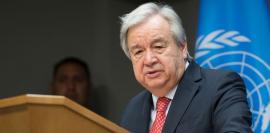
United Nations (UN) Secretary-General, António Guterres, has urged developed countries to keep their promises to developing nations by meeting the climate finance commitment of US$100 billion.
This is after rich nations made a pledge in 2009 to the less wealthy countries at a UN Climate Change Conference in Copenhagen, Denmark, to assist them in adapting to climate change and alleviate rises in temperature by 2020.
Guterres also called on the wealthy nations to double adaptation finance, replenish the Green Climate Fund, and operationalise the loss and damage fund this year.
“As a matter of justice, Africa must be considered a priority in all these efforts,” he stressed.
He delivered the remarks at the BRICS-Africa Outreach and BRICS Plus Dialogue, which was held during the 15th BRICS Summit at the Sandton Convention Centre, Johannesburg.
Guterres said the climate crisis was spiralling out of control and urged world leaders to step up their efforts to tackle it.
“I have put forward a Climate Solidarity Pact in which developed countries provide financial and technical support to help emerging economies – in Africa and beyond – to promote an equitable and just transition to renewable energy.”
He told delegates that he presented an Acceleration Agenda, which aims to see developed countries committing to reach net zero by 2040 and developing nations as close as possible to 2050.
The Secretary-General also touched on the crisis of cost of living.
He stated that poverty, hunger, and inequalities are growing against the Agenda 2030 for Sustainable Development’s objectives.
“Geopolitical divides and conflicts are multiplying with profound global implications, especially the impacts from the Russian invasion of Ukraine.”
Multipolar world
While nations were eyeing a multipolar world, he said multipolarity was not enough to guarantee a peaceful or global community.
“To be a factor of peace, equity, and justice in international relations, multipolarity must be supported by strong and effective multilateral institutions.”
Guterres is advocating for a strengthened and reformed multilateral architecture based on the UN Charter and international law.
“Today’s global governance structures reflect yesterday’s world. They were largely created in the aftermath of World War II when many African countries were still ruled by colonial powers and were not even at the table.
“This is particularly true of the Security Council of the United Nations and the Bretton Woods institutions.”
For multilateral institutions to remain universal, he said they must reform to reflect today’s power and economic realities.
“In the absence of such reform –– fragmentation is inevitable.”
Cooperation
Guterres said the world cannot afford a divided global economy and financial system, diverging strategies on technology, and conflicting security frameworks.
“The IMF [International Monetary Fund] estimates that such a fracture could cost 7% of global GDP [gross domestic product] – a cost that would be disproportionately borne by low-income countries, mainly in Africa.
“And so I have come to Johannesburg with a simple message, in a fracturing world with overwhelming crises, there is simply no alternative to cooperation.”
He advised leaders to urgently restore trust and reinvigorate multilateralism for the 21st century.
“This requires the courage to compromise in the reforms necessary for the common good.
“It requires full respect for the UN Charter, international law, universal values, and all human rights – social, cultural, economic, civil, and political. And it requires much greater solidarity,” he stressed, admitting that none of this was easy.
“But it is essential. And is essential, especially for Africa.”
He acknowledged that Africa, a historical victim of slavery and colonialism, continues to confront grave injustices.
“On average, African countries pay four times more for borrowing than the United States and eight times more than the wealthiest European countries.”
Guterres also noted that African states account for just 4% of global greenhouse gas emissions, but are an epicentre of climate chaos.
“Looking ahead, I see two priorities for action and justice. First, on the economic front. Redesigning today’s outdated, dysfunctional, and unfair global financial architecture is necessary, but I know it won’t happen overnight. Yet we can – and must – take practical action now.”
He has since proposed an effective debt workout mechanism, and other steps necessary to multiply the resources available for developing countries are vital for sustainable development in Africa and its people. – SAnews.gov.za


